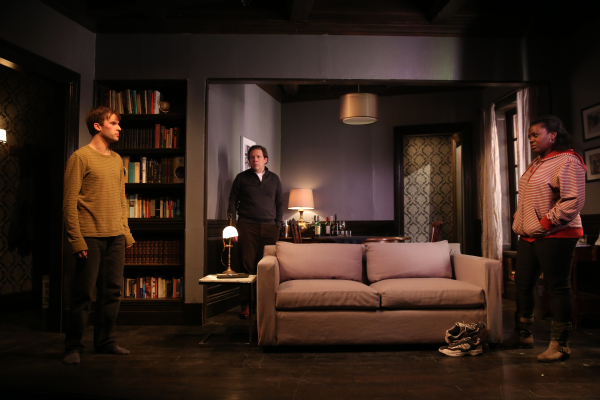
(© Joan Marcus)
Do you believe in ghosts? What about the afterlife? Chances are, after a viewing of Ken Urban’s unsettling drama The Correspondent, now receiving its world premiere at the Rattlestick Playwrights Theater, you’ll be left questioning many of your deeply held beliefs. This sublimely disorienting production from director Stephen Brackett (Buyer & Cellar) is so disturbing because it is grounded in stark reality. You might feel like you’ve entered the Twilight Zone…only with full-frontal male nudity.
Philip Graves (Thomas Jay Ryan) is a senior partner at a Boston law firm. He recently saw his wife, Charlotte, die in front of him in a traffic accident, and he’s wracked with guilt. He’s hired an afterlife telegram service to contact her: That’s when a terminally ill person charges a fee to pass along a message to the dead (yes, they really exist). Philip’s messenger is Mirabel (Heather Alicia Simms), a young black woman dying of cancer. When Philip begins receiving letters from his wife (in her handwriting), he suspects that Mirabel might know something about it. She claims ignorance, but thinks the notes might have something to do with a mysterious hooded young man (Jordan Geiger) she’s seen lurking around Philip’s Beacon Hill home.
Our journey mirrors Philip’s. He doesn’t know whom to believe in this world of unreliable narrators, and neither do we. Urban has wisely written his protagonist as a staid and well-educated professional (the kind of person who might attend a downtown writer’s theater) — one who is highly unlikely to believe in the supernatural, but in his emotionally fragile state is more open than usual. And considering we’re sitting in a theater (where magic often happens), so are we.
The design of this play is flawless. Andrew Boyce has imagined Philip’s apartment down to the slightest detail, from the wood paneling to the wilted condolence flowers to the Jonathan Franzen novels molding on the built-in shelves. Lighting designer Eric Southern has created a dark world, mostly visible through the yellow incandescent bulbs one would expect to illuminate hours of silent reading, washed down with copious amounts of red wine. With her cardigan on the chair and a half-eaten meal preserved like a shrine, one can still feel Charlotte’s ghost haunting the room. Mostly, though, the space feels incredibly lonely. Every item on the actors’ bodies (Mirabel’s bubble coat, Philip’s reading glasses, the young man’s thin white briefs) is ideally selected by Jessica Pabst for maximum realness. Daniel Kluger’s eerie sound design underscores the proceedings with an intensity that grows as we follow Philip further down the rabbit hole.
The steady and detailed approach Brackett has taken with the design crosses over into the performances. Ryan’s Philip is lawyerly and controlled, but with deep emotional scars that are just barely scabbed over. Simms’ Mirabel offers the kind of lovingly delivered straight talk that can easily cross over into malice at a moment’s notice. As the young man, Geiger is given the difficult task of selling the most strange and unusual aspects of this chilling tale; the more unlikely his story becomes, the more you want to believe him, I imagine much the same way Philip does.
You don’t want to miss this disquieting play, the specter of which will likely linger in your thoughts for days after.









